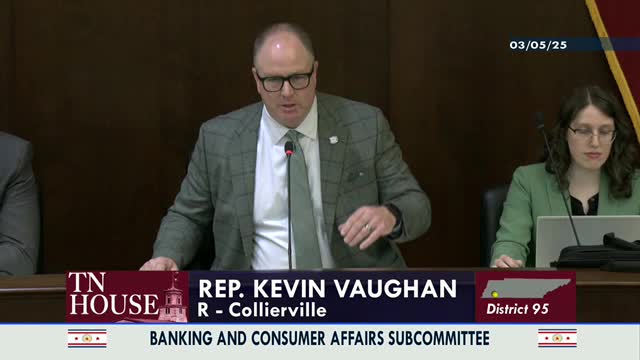Subcommittee rejects bill that would change who gets priority for investor securities in insolvency (House Bill 443)
Get AI-powered insights, summaries, and transcripts
Subscribe
Summary
The Banking & Consumer Affairs Subcommittee defeated House Bill 443, a measure that would have altered Uniform Commercial Code Article 8 rules to give individual entitlement holders priority over secured lenders and to restrict choice-of-law clauses; the vote was 1–4.
At a meeting of the Banking & Consumer Affairs Subcommittee, members voted 1–4 to defeat House Bill 443, legislation that would change portions of the Uniform Commercial Code governing electronic securities accounts and the priority of claims if an intermediary becomes insolvent.
The bill, sponsored by Representative Halsey, would have made two principal changes: require disputes over customer securities to be governed by the law of the customer’s jurisdiction rather than the law chosen by a securities intermediary, and alter priority rules to place an investor (an “entitlement holder”) ahead of secured lenders if a custodian or intermediary becomes insolvent. "This deals with the uniform commercial code, and my bill just does 2 things," Representative Halsey told the committee.
Proponents said the current Article 8 structure creates a class of secured creditors who can sweep pooled assets in insolvency. Don Grandy, an attorney representing True North Public Policy, testified that the 1994 revision to Article 8 created the concept of a "security entitlement" that differs from holding a paper stock certificate and that portions of Article 8 (referred to in testimony as section 8‑5‑11) contain carve-outs that can allow secured creditors to obtain priority in certain insolvencies. David Theis, a private citizen and former fund manager, told the committee the law "essentially takes away the ownership rights of individual private citizens, private corporations and pension funds."
Opponents — including Tim Amos, a Tennessee uniform law commissioner; Amy Hazlett of the Tennessee Bankers Association; and Steven Sepanek, an adjunct professor at Vanderbilt Law School who chaired the American Bar Association UCC committee for three years — urged the committee to reject the bill. Hazlett said the indirect-holding system "provides many advantages for investors" and that the narrow exceptions proponents cite mostly apply to margin accounts or to secured credit extended to clearing corporations. Sepanek warned that altering choice-of-law rules "could be disastrous for Tennesseans" and undermine the uniformity the UCC aims to preserve.
Committee members pressed witnesses on who would benefit and who might be harmed if states diverged on these rules. Supporters said the measure was aimed at large, "protected class" banks and clearing houses; critics responded that the bill could harm Tennessee intermediaries and make counterparties unwilling to do business with them.
After roughly two hours of testimony and questioning, the clerk reported the tally: 1 aye and 4 noes, and the motion failed. The committee recorded the outcome but did not adopt any amendments or send the bill forward.
The debate touched on past insolvencies as examples: witnesses referenced the Lehman Brothers collapse in 2008 and related litigation to explain how pooled, fungible holdings and certain bankruptcy
